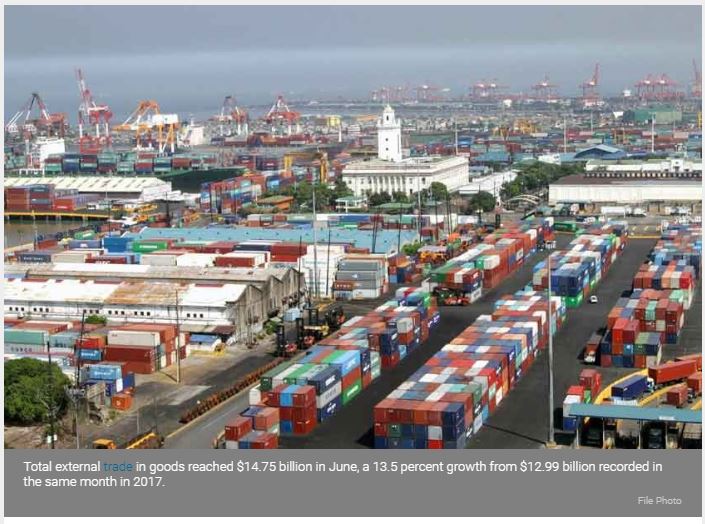Philippines: Trade deficit further widens in June 2018
As Exports Fall For 6th Straight Month
MANILA, Philippines — The country’s trade deficit more than doubled in June as exports continued to decline and imports grew steeply, the Philippine Statistics Authority (PSA) reported yesterday.
Total external trade in goods reached $14.75 billion in June, a 13.5 percent growth from $12.99 billion recorded in the same month in 2017.
The PSA said total exports fell for the sixth straight month, although by a mere 0.1 percent from $5.704 billion in June 2017 to $5.700 billion last June. By destination, the biggest export markets in June were Hong Kong, US, Japan, China, Singapore, Germany, Thailand, Netherlands, Taiwan and Korea.
Total imports, on the other hand, rose to $9.05 billion in June 2018 from $7.29 billion in the same month last year, an annual growth rate of 24.2 percent. By source, the biggest markets were China, Korea, Japan, Thailand, US, Singapore, Indonesia, Taiwan, Malaysia and Vietnam.
This brought the balance of trade in goods to a $3.35 billion deficit in June 2018, higher than the $1.59 billion deficit in June 2017.
The National Economic and Development Authority (NEDA) attributed the continued decline in exports to lower revenues from mineral and agro-based products. The drop however, was only marginal as lost revenues were slightly offset by higher revenues from manufactures, forest products and petroleum.
Imports, meanwhile were boosted by more inbound shipments of raw materials and intermediate goods, capital goods and consumer goods.
NEDA said there is a need for a “more aggressive” promotion and development of Philippine exports.
“Creating a broader market base for exports through effective trade facilitation and by effectively utilizing existing free trade agreements, as well as forging new ones, are important in improving our export market moving forward,” said Socioeconomic Planning Secretary and NEDA chief Ernesto Pernia.
Pernia said the government needs to ensure that the country’s National Single Window is already operational in 2018 as planned. This sets up necessary infrastructure that would seamlessly connect relevant agencies involved in processing export and import permits and other trading requirements.
The recent signing of a memorandum of understanding between the trade officials of the Philippine government and the United Arab Emirates to create a more enabling trading environment is also a positive development, particularly in terms of halal goods accreditation.
Pernia also said there is progress in the negotiations for a possible US-Philippines Free Trade Agreement in a bid to expand markets for the country’s agricultural products like carrageenan and seaweed, as well as for garments and textiles.
“We should also negotiate for lower tariffs with other trade partners. In the case of bananas for instance, the reduction in tariffs will enable the country to compete with other banana exporters,” Pernia said.
Apart from expanding market access, unfair logistics pricing should also be addressed, he said.
He noted the DTI has recently called on the Philippine Competition Commission to review shipping charges of foreign shipping lines, as excessive logistics costs undermine the competitiveness of traders.
Source: https://www.philstar.com/business/2018/08/09/1840819/trade-deficit-further-widens-june-2018#Xe6VssEAokQLydFE.99


 English
English




